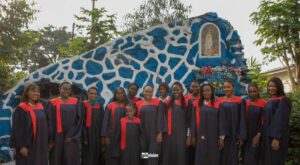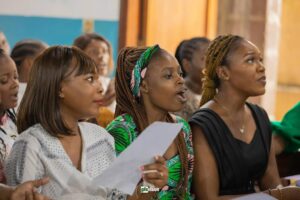The second edition of “Joy Happenings: Choirs in Opera,” hosted by Operanauts Inc (USA) and OPERANAUTS DRC, concluded on Sunday, leaving a lasting impact on the Chorale Angélus of Sainte Élisabeth Catholic parish in Ngaliema, Kinshasa.
“Today we close the second edition of the program called ‘Joy Happening: choirs in opera’, dedicated to the training and promotion of choirs in opera music. Only the Chorale Angélus of Sainte Elisabeth parish made it to the end of the training and was rewarded,” said Dorcas Masika, executive director of the program.
“Several choirs were expected to take part in this training program in order to choose the best three for the Cong’Opera festival in 2025. Nevertheless, others have withdrawn, banned from participating in para-liturgical activities,” she added.
The Chorale Angélus management team evaluated the opera choir training program using three important metrics, namely: “Development of vocal technique”, “Musicality and interpretation” and “Ensemble collaboration and cohesion.”
The focus of vocal technique development was on measuring improvements in fundamental vocal skills, including breath control, resonance, intonation, diction, and range extension.
“Choristers should evaluate whether the program offers effective advice on vocal health, warm-up exercises and technical skills that improve their sound quality and cohesion in the choir,” said the organizer. 
With regard to musicality and interpretation, choristers benefited from the program in the development of choristers’ musical expression, phrases, dynamics and emotional storytelling.
“Choristers should seek training that enhances their ability to interpret different operatic styles, languages and historical contexts, enabling them to effectively convey history and emotion,” he recommended.
On the basis of these three metrics, the choir’s Technical Vocal Director, Axel Tshinanga said: “At our level, within the Chorale Angélus, there have been improvements in terms of vocal technique. We’ve made great strides, organizing presentations around the piece “Gloria all’Egitto (The Triumphal March), from Giuseppe Verdi’s opera, AIDA”. He adds: “We had to understand the history of the song, translate it into French to understand the context in which it was composed. We had dictation and pronunciation moments to enable the choristers to appropriate and sing it with ease.”
Voice technique to strengthen the choir!
From the point of view of collaboration,” he continues, ”this work by Verdi is highly technical, as it predisposes us to extend the voice. It has enabled us to evolve in terms of breathing, in terms of pronouncing phrases, in terms of notes to be reached, in terms of vocal extension. The advantage with it is that it predisposes us to purely technical work from the point of view of position, momentum, and pronouncing phrases. “
 Founded in 2013, the Chorale Angélus has a broad vision for its activities.
Founded in 2013, the Chorale Angélus has a broad vision for its activities.
“Doing opera or classical has always been another artistic dimension for us. It’s really the style of our choir, with ambitions to be a little more evangelical than liturgical, which is why we’re in the process of taking part in everything that’s competitive, to go a little further in this evangelization through song,” concluded Moïse Yumba, President of the Chorale Angélus.

